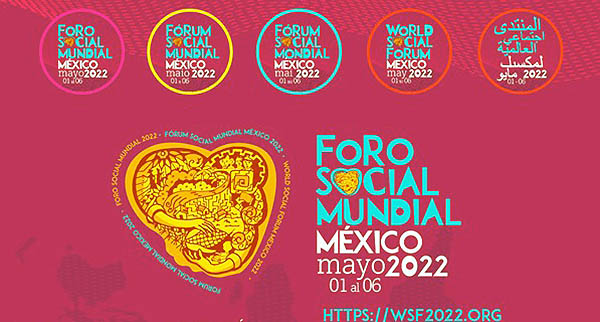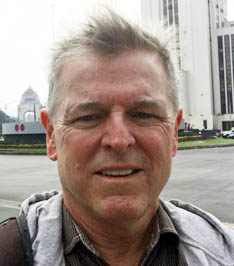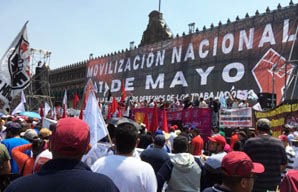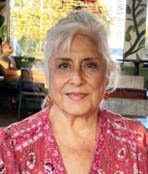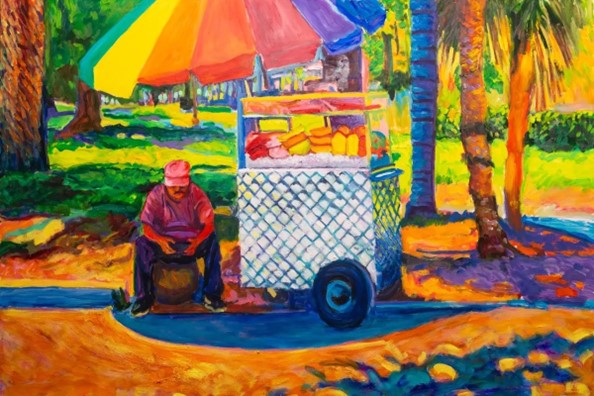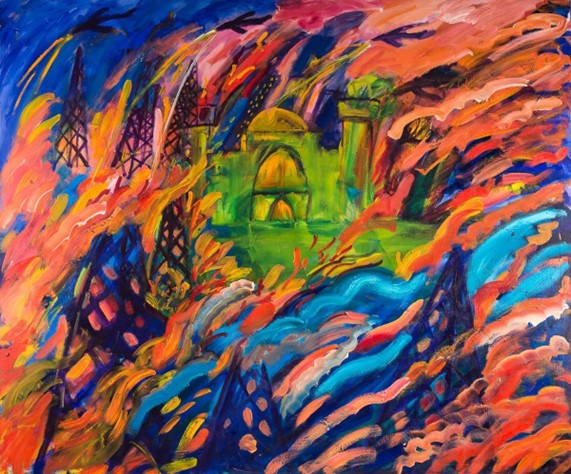|
|
|
|
The weekly newsletter of the México Solidarity Project |
|
|
|
June 1, 2022/ This week's issue/ Meizhu Lui, for the editorial team |
|
|
Another World (Social Forum) Is Possible |
|
Does the world seem to be spinning out of control to you? Time for most of us used to move in an orderly and uniform tick tick tick. But you don’t have to be an Einstein these days to experience time’s relativity. Time now seems, deep in our guts, to have no predictable progression.
The World Social Forum has been, over the years, a gathering place for people worldwide who see that time has run out for capitalism — and will run out for all of us if we don’t put an alternate economic system in place. Here in 2022, with climate disaster looming, the urgency of creating another world could hardly be hotter. Can the basic World Social Forum model — plenty of open space and horizontal organization — be up to the task?
Back in 2005, at the height of the World Social Forum effort, an amazing 150,000 activists came together. Last month’s 2022 WSF in México City, as Daniel McCool relates in our interview this week, had 3,000 in-person participants and turned out to be, for many of those participants, as frustrating as useful. Little went as planned. Or maybe planning had been too little. Serendipity soon became the order of the day. People found themselves chancing upon great workshops on topics they never realized they had any interest in. Life’s like that. We don’t move in straight timelines. Our lives take serendipitous turns.
The World Social Forum has now turned age 21, the US drinking age, our weird way of marking adulthood. The Forum has shrunk over the years even as social movements have grown and the disastrous consequences of neoliberalism have become more and more obvious. From Indonesia and Sweden to Saudi Arabia and México, recent years have brought massive mobilizations around feminism, climate justice, anti-racism, and so much more.
Affinity groups that showcase alternatives and share lessons constitute a necessary stage of political development, and affinity-group approaches remain still useful today. But to make another world probable, movements, issues, and activists across the globe need to be united in their strategic thinking. It’s time to ask: Is another WSF possible? |
|
|
|
Don’t miss an issue. Subscribe to the weekly México Solidarity Bulletin! |
|
|
|
|
Bumps on the Pathway to Another World |
|
Daniel McCool, a transplant from Montreal who’s been in México for 22 years, works as a teacher, translator, and editor. McCool has a background in development economics and a particular interest in alternative socioeconomic models. He’s now living by choice in a rural area of Oaxaca, where he’s studying new approaches to food production and self-sufficiency. At last month’s World Social Forum in México City, McCool accompanied foreign visitors who needed housing and language interpretation.
What drives your interest in different economic models? |
|
|
Daniel McCool: I’ve witnessed the disturbing social trends in México that the neoliberalization process has sped up over the last few decades. I used to be critical of López Obrador from the left, but after the disastrous presidencies of Calderón in 2006 and then Peña-Nieto in 2012, after elections stolen from AMLO, I became a big admirer. The neoliberal obsession with just increasing GDP — gross domestic product — has to stop! GDP measures how much money gets spent, but says nothing about who has the money and who doesn’t.
The World Social Forum took place in México City May 1-6. How did México get chosen to be the site?
In 2010, the World Social Forum didn’t have just one site. Different countries had their own simultaneous gatherings. Mexico was selected for 2022 in part for its 2010 success. Under then-mayor of México City Marcel Ebrard, now AMLO’s foreign secretary, the Zocalo was turned over to the WSF. The city government set up 14 large tents, provided wifi, and gave visa help to international guests. Ebrard himself came and gave an official welcome.
People anticipated that current México City mayor Claudia Scheinbaum, a more progressive leader than Ebrard, would behave similarly. But there was no official governmental welcome, and the lack of support was disappointing. |
|
What was attending the 2022 WSF like?
Chaos! Organizers had to scramble in the final weeks to find venues for the events. They got help from the unions at UNAM, México’s top university, and other organizations like the city’s Mining Museum. The World Social Forum organizers may have made assumptions about government support that did not materialize. |
|
|
The WSF opened on May 1 with a May Day parade. About 3,000 people from 30 different countries came. In terms of workshops, this was supposed to be a hybrid online/in-person event, but many venues did not have the capacity for simultaneous broadcasting of events, making international participation impossible. Some anticipated venues were canceled at the last minute, and the times for each event appeared only in international time rather than local México City time, and that just confused everyone even more.
In my case, of the first ten or so events I wanted to attend, only two took place in their original venues and at their posted times. Once I accepted that few of the events were taking place where they were supposed to take place, I did the only thing I could do, go to the major venues and select from whatever was going on there.
Were you able to get the information, inspiration, and contacts you were looking for? |
|
Luckily for me, the Social Economy events had been well organized in advance, and I came away impressed with the solidarity economy projects going on across Latin America. People are experimenting with alternatives, rooted in local conditions and cultures, to see what can work where. México City, for instance, has a barter program that eliminates the use of money and helps the underemployed get products they couldn’t otherwise afford. |
|
|
Other dynamic plenaries at this year’s WSF included one that featured union organizers from India, Brazil, Canada, and México.
How are people doing follow-up to expand their global networks?
Meetings are still going on to set up the structures for closer ties between organizations within México — about half of the participants were Mexican — and globally. In terms of solidarity economies, dialogues between México and other Latin American countries are taking place every two weeks. July is going to see a meeting in Brazil for TransAmazonian groups and a get-together for the Transformation Networks of Colombia.
It was the logistics of the WSF that were frustrating. I remain hopeful both for the future of México under Morena and for growing international exchanges that explore concrete ways to make other worlds possible. |
|
|
Margaret Garcia’s ‘Arte Para la Gente’ |
|
California’s Museum of Ventura County is now hosting the first retrospective of the Chicana artist Margaret Garcia’s work. This exhibition — Arte Para La Gente, Art for the People — brings to the fore Garcia’s exceptionally bright color palette and coarse textured style of painting. Jimmy Centeno, in this review adopted from a piece published originally in Counterpunch, explores three of Garcia’s most stunning oils. |
|
|
Margaret Garcia |
|
In American Dream (2020) Margaret Garcia captures a silent moment on a bright day for a paletero — popsicle vendor — sitting on a park curbside. As street workers trying to eke out a living, paleteros and other street vendors such as eloteros — corn sellers — face challenges that range from discrimination to assaults. Garcia’s gaze offers dignity, empathy, and acknowledgment for those who toil day in out, but who get categorized at the low end of capitalist societies. |
|
|
In Glorious Echo Park (2020) Garcia chooses an angle that avoids downtown Los Angeles. She snuffs out any reference to the center of power in the far distance. Instead, Garcia paints a promising horizon: warm and hopeful during difficult, uncertain times. |
|
|
Shock and Awe (2005), a political protest painting, addresses the destruction of life by the U.S. government in the Iraq War. Her concern: the terror experienced by children, families, and the entire Iraqi people. |
|
|
Garcia’s personal narrative and community work have been central to the history of Chicano art in LA. For four decades she has given voice to the people. Asked how she represents her Chicano community, Garcia responds simply: “By painting my community!”
“Sometimes,” she adds, “I feel like an envelope brown and unaddressed. This is an effort to fill that envelope and address it. It is a personal journey that takes place in my history, my family, my heritage, and my identity. It is a physical identity encompassed by a social identity. I look to become whole so that I may become part of the whole.” |
|
|
Recent news reports and commentaries, from progressive and mainstream media,
Bruce Hobson, The Most Important Recent Labor Victory You Never Read About, Nation. At this GM plant in central Mexico, workers on both sides of the border came together to challenge corporate power.
Tracy Wilkinson and Cecilia Sanchez, Mexican president unlikely to attend Summit of the Americas in L.A. next month, Los Angeles Times. Despite a major U.S. lobbying effort, AMLO will likely not attend a high-stakes regional summit next month because the Biden administration refuses to invite all the hemispheric nations.
Mathieu Tourliere, El juego de los destapados, una bomba de tiempo en el partido del presidente, Proceso. Detrás de la aparente cordialidad en la contienda interna –alentada por el propio presidente– se agudiza una batalla por reivindicarse como sucesor natural del proyecto de la 4T.
AMLO’s Morena party gets top marks; approval rating well above other parties, México News Daily. Morena now ranks as the only party that receives mostly positive ratings.
AMLO quiere cambiar nombre al ‘Triángulo Dorado’ del narco, Chron. López Obrador dijo durante una visita a la zona que el nombre estigmatiza injustamente a los habitantes. |
|
|
The Mexico Solidarity Project brings together activists from various socialist and left organizations and individuals committed to worker and global justice who see the 2018 election of Andrés Manuel López Obrador as president of México as a watershed moment. AMLO and his progressive Morena party aim to end generations of corruption, impoverishment, and subservience to US interests. Our Project supports not just Morena, but all Mexicans struggling for basic rights, and opposes US efforts to undermine organizing and México’s national sovereignty.
Editorial committee: Meizhu Lui, Bruce Hobson, Bill Gallegos, Sam Pizzigati, Courtney Childs, Victoria Hamlin, Agatha Hinman, Steven Hollis. To give feedback or get involved yourself, please email us! |
|
|
|
Web page and application support for the México Solidarity Project from NOVA Web Development, a democratically run, worker-owned and operated cooperative focused on developing free software tools for progressive organizations. |

